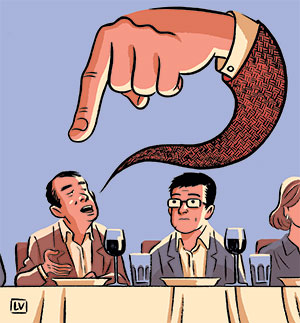One-way conversations? Blame social media

Roula Khalaf, Editor of the FT, selects her favourite stories in this weekly newsletter.
It was some time after I had clocked up 10 minutes discussing the business of selling air-conditioning units in St Albans that I began to regret my interest in other people.
The setting was a classic social situation. At a recent dinner, surrounded by people I did not know but who appeared to know each other, I started talking to the similarly displaced man next to me. When he volunteered that he knew our host through his business, it seemed natural to ask what line he was in. Ten minutes later, my neck was stiff from the blast of cold air. His was a business I knew nothing about, so it was initially easy to be interested. It was also the only subject on which he appeared able to talk with any degree of animation and – in theory – we could have discussed the business environment or climate change. But we didn’t, and so once we had established that his catchment area extended well into Hemel Hempstead and Watford, we inevitably reached the end of the conversational arc. At this point he lapsed into silence. It was as if, having discussed him, we had exhausted all areas of interest. But perhaps he was simply cursing his luck at being placed next to the one person in the world who actually wanted to talk about the air-con business.
Increasingly, it seems, people no longer see conversation as a way to gain another perspective or to find out something they did not know. Instead it is a public rendering of their LinkedIn profile page, a chance to highlight their endorsements and bring you up to speed on what they have been doing. People will talk about themselves, their jobs, their lives with gusto but without the good manners to show the same interest in anyone else. The rules of reciprocity appear to have been set aside. Today one does not so much converse as take oral selfies.

It is not that I am self-effacing. Nor – as this column might suggest – am I averse to talking about myself. When it comes to egotism, I like to think I remain competitive. But I was also taught that conversation should be, well, a conversation.
Perhaps the most egregious example of conversational narcissism came a few months back at a reunion of my wife’s old schoolmates.
A person I can only describe as the dominant female began talking about herself and, almost in passing, mentioned that a contemporary had died very suddenly. Everyone gasped. “I know,” she replied. “I was in the shopping centre when I heard and I could not believe it. I went into shock. I couldn’t speak for 10 minutes.” (This last point does, I think, reinforce how shocked she must have been.) But how did he die? She waved the question away. “Seriously, I was depressed for about a week.” The poor dead classmate was not the tragic subject of the story but the antagonist who selfishly died and depressed our narrator.
By contrast, the best conversationalist I have ever met was the brother of a close friend – a modest polymath who was not only able to talk about other people’s specialist fields but was always delighted to do so. Had he been at the dinner he would have been genuinely enthused by air conditioning and almost certainly have recently read a fascinating article about it in New Scientist. In general, if you allow yourself to be interested in others, it is amazing how often they turn out to be interesting.
This, I should acknowledge, is less an issue at work functions, where attendees share either a common interest or the gathering has an explicit networking purpose. It is most prevalent at social events, where strangers are struggling to find things in common. Looking back, I can see our mistake has been not to realise that the rules have changed so that in a room full of narcissists, reticence now has to be its own reward.
Where once you did not thrust yourself forward for fear of appearing pushy, today increasingly you must choose between doing so or having the conversation entirely dictated by others. Perhaps in the near future all invitations to social engagements could include links to the other guests’ social media pages, so we can read up in advance. That way, we might even spare ourselves the bother of attending.
——————————————-
robert.shrimsley@ft.com; Twitter: @robertshrimsley
Illustration by Lucas Varela
Comments